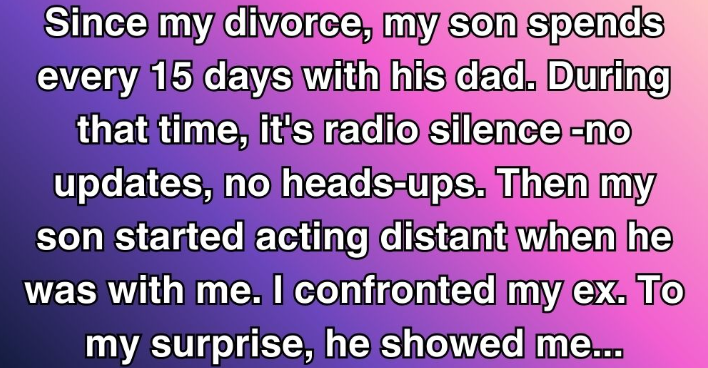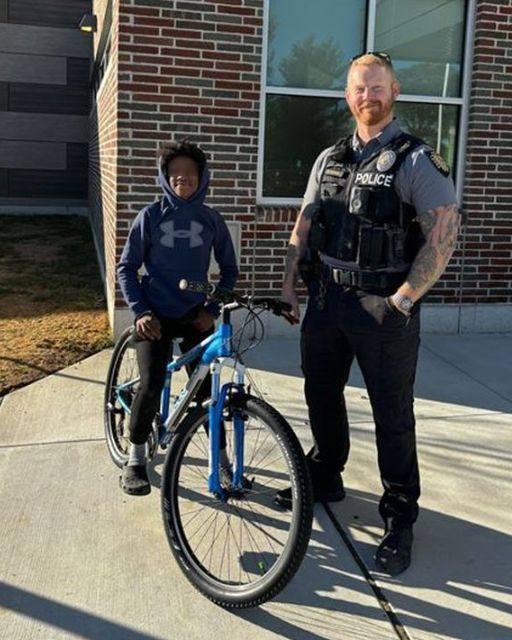Since my divorce, my son, Sami, spends every 15 days with his father. During those periods, I receive no updates, no communication. Then I noticed Sami growing distant when he returned to me. I confronted my ex about it. To my astonishment, he showed me the messages I’d sent—every “Checking in on Sami?” or “How’s he doing?”—and then displayed his responses, which I’d never received.
He hadn’t ignored me. My number was blocked.
Strangely, he insisted he hadn’t done it. He suggested Sami, our 11-year-old, must have. I brushed it off initially, thinking a child wouldn’t do that without cause.
But then I started observing more closely.
When Sami returned from his dad’s, he barely acknowledged me. No “Hey Mama,” no warm hugs. He used to rush to me, eager to share his drawings or ask about dinner. Now, he headed straight to his room. I attributed it to pre-teen moods or the strain of moving between homes.
But the distance wasn’t only emotional.
When I asked about his weekend, he’d say, “It was okay.”
“What did you do?”
“Not much.”
His responses were short, lifeless, as if I were a stranger prying into his life.
One evening, I caught him using his old iPad, one I thought was secured. I asked what he was doing. He claimed he was playing a game, but his trembling hands betrayed him. I didn’t press further.
A week later, I discovered the iPad’s password had been changed—without my involvement.
I confronted Sami directly. “Did you block my number on your dad’s phone?” His expression was as if I’d struck him.
He shrugged. “I don’t remember.”
I waited. Then he murmured, “I didn’t want you and Baba to argue.”
That’s when I sensed something deeper.
So, I did something I wasn’t proud of. While Sami slept, I searched his bag. Hidden in a rarely used pocket was an old, cracked phone I didn’t recognize. It was functional.
There were messages—not many, but enough. And they weren’t from his dad.
They came from a woman named Lamia.
The texts were vague but overly familiar:
“Sami, remind Baba I made lasagna—he always forgets.”
“If Mama asks too many questions, say you’re tired.”
“Aquarium next weekend. Our secret 💙”
My breath caught in my throat.
It sank in slowly. My ex wasn’t simply dating someone. He was allowing another person to co-parent my son behind my back.
And Sami—my sensitive, awkward boy—was caught in the crossfire.
I confronted my ex again, this time insisting on an in-person meeting for Sami’s sake. He agreed, and we met at a cafe near the train station—a neutral space.
I showed him the messages. I expected excuses, deflection, or anger.
Instead, he exhaled heavily.
“She’s my girlfriend,” he admitted. “We’ve been together for over a year.”
I stared. “And you didn’t think to tell me? The mother of your child?”
He rubbed his temples. “I wanted to wait until it was serious. I didn’t want conflict.”
I leaned forward. “You let her text my son without my knowledge. That’s not conflict?”
He replied, “She cares about him. She’s good to him.”
That might have been true. I wasn’t upset about the relationship itself. I was furious about the secrecy—how they’d encouraged my son to deceive me, making me feel like an outsider in his life.
Leaving the cafe, I wasn’t only angry. I was wounded.
That night, I sat Sami down and told him he could always talk to me openly, without hiding anything.
He looked at his hands and asked, “Do you not like Lamia?”
I answered honestly. “I don’t know her. But I don’t like secrets, especially when they make you feel like you have to lie.”
He nodded. “She said I should protect Baba. That sometimes moms get upset and take kids away.”
My stomach churned.
This wasn’t about lasagna or aquarium trips.
This was about sowing fear.
The following week, I contacted a lawyer—not to wage war, but to establish boundaries. I requested a formal co-parenting plan with clear communication rules. No more secret texts. No third parties messaging my son without my consent.
My ex didn’t resist. I think he knew, deep down, I was right.
But then came an unexpected turn.
Months later, I received a message from Lamia.
It began courteously: “I know you may not like me, but I’d like to explain.”
She shared that she hadn’t intended to come between me and Sami. Having grown up with divorced parents, she understood the pain of being caught in the middle. She said my ex had described me as unpredictable and claimed I’d cut off contact, which led her to believe texting Sami directly was acceptable to “keep him calm.”
Then she revealed something startling: “I ended things with him.”
She explained that spending time with Sami made her question my ex’s behavior. She noticed he was coaching Sami to say certain things and never corrected him when he dismissed me or showed disrespect.
“He blames you for everything,” she wrote. “Even when it’s clearly his fault.”
She said she couldn’t stay with someone who disrespected the mother of his child.
I didn’t reply immediately. I needed time to process.
Her message lingered in my mind.
Months later, when Sami asked if Lamia could attend his piano recital, I didn’t refuse.
I wasn’t thrilled, but I didn’t want Sami to feel torn between loyalties.
She came, stayed in the back, clapped quietly, and didn’t linger.
Afterward, she approached me and said, “He’s lucky to have you.”
And I believed her.
It took nearly a year to rebuild trust. I enforced clear rules—no unauthorized texting, no hidden plans. But I gradually lowered my guard, ensuring Sami didn’t feel caught between worlds.
He’s more open now, laughs more freely. He still moves between homes, but the tension has eased.
I’ve learned to trust my instincts. If something feels wrong, it likely is.
The surprising part? I don’t dislike Lamia. I don’t embrace her either, but I respect that she stepped back when she saw the harm. She chose not to enable my ex’s bitterness.
That’s more than I can say for him.
We barely communicate now, but I’ve accepted that. Co-parenting doesn’t require friendship—just commitment to the same child and a refusal to use him as a pawn.
To anyone navigating this: establish boundaries, not battles. You don’t need to win every fight. Protect the peace—especially the kind your child carries within.
And if someone’s planting fear in your child under the guise of love, don’t overlook it. Ask the tough questions.
They’ll appreciate it someday.
If this story struck a chord, share it. Someone else might need the encouragement. ❤️



